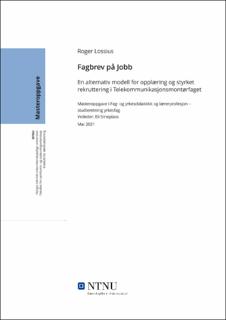Fagbrev på jobb: En alternativ modell for opplæring og styrket rekruttering i Telekommunikasjonsmontørfaget
Master thesis
Permanent lenke
https://hdl.handle.net/11250/2976527Utgivelsesdato
2021Metadata
Vis full innførselSamlinger
- Institutt for lærerutdanning [3692]
Sammendrag
Hensikten med denne masteroppgaven er å undersøke hvordan voksne hjelpearbeidere i Telekommunikasjonsmontørfaget opplever deres nye opplæringssituasjon gjennom Fagbrev på jobb-ordningen. Ordningen som ble vedtatt i 2018 er en ny vei til å fullføre videregående kompetanse med fagbrev, og deltakernes opplevelse av denne ordningen er ikke tidligere beskrevet. Oppgaven vil også utforske hvilke muligheter og utfordringer som ligger innenfor Fagbrev på jobb-ordningen for involverte aktører som regjering, fylkeskommune, bedrift, for bransjen og for kandidater. I tillegg undersøkes spørsmålet om kvaliteten på fagarbeiderne som kommer gjennom alternative opplæringsmodeller slik som Fagbrev på Jobb og Praksiskandidatordningen. Oppgavens hovedproblemstilling er hvordan opplever voksne Fagbrev på jobb-kandidater i Telekommunikasjonsmontørfaget situasjonen sin med opplæringen i bedrift. Det vil også være to underliggende forskningsspørsmål som går utenfor deltakernes opplevelse mer spesifikt, men som vil være nyttig med tanke på å belyse organisering av opplæringen innen ordningen, rekrutteringsproblematikk og ordningens legitimitet innen bransjene som skal ta den i bruk.Dette er en kvalitativ studie, hvor fire kandidater med opplæringskontrakt i Telekommunikasjonsmontørfaget innenfor Fagbrev på jobb-ordningen, er intervjuet om sine opplevelser med det å være voksen i et yrkesfaglig opplæringsløp. Informantene arbeider alle sammen ved samme elektroentreprenør og har fått tilbud om å ta fagbrev grunnet manglende rekruttering av Telekommunikasjonsmontører, og liten tilsøking av lærlinger fra videregående skole.Studien viser at til tross for at indre motivasjon fremheves som en betydelig suksessfaktor for voksnes læring av flere, er informantene i denne undersøkelsen kanskje først og fremst drevet av ytre motivasjonsfaktorer. Informantene i denne studien er samstemte om at betalt tid til opplæring vil være viktig for dem og deres læring. Dette bekrefter hva tidligere studier om voksne under utdanning sier, men i tillegg fremhever informantene tid til samarbeid seg imellom som noe som vil kunne ha stor betydning for deres læring. I oppgaven blir det også presentert data som sammenligner hvordan det går med praksiskandidater og lærlinger på fagprøven, da de som tar fagbrev som praksiskandidat ofte har lik bakgrunn som de som ender opp i Fagbrev på jobb-ordningen.Resultatene viser at praksiskandidater gjør det vesentlig bedre enn lærlinger på Fagprøven innenfor elektrofagene. Masteroppgavens hovedkonklusjon er at det må settes av betalt arbeidstid til det teoretiske VG3-kurset slik at kandidatene kan samarbeide og dra nytte av hverandres erfaringer, men også gjøre den nye opplæringssituasjonen overkommelig med tanke på de voksnes kandidatenes livssituasjon. Før VG3-kurset starter bør kandidatene få et kurs eller teoretisk opplæring på et lavere nivå. Dette punket blir desto viktigere om kandidatene har negative erfaringer med teoribaserte opplæringssituasjoner fra tidligere. The purpose of this master's thesis is to investigate how adult auxiliary workers in the Telecommunications installation vocation experience their new training situation through the Trade Certificate at Work scheme. The scheme that was adopted in 2018, is a new way to complete upper secondary competence with a trade certificate, and the participants' experience in this scheme has not been previously described. The thesis will also explore the opportunities and challenges that lie within the Trade Certificate at Work scheme for involved actors such as the government, the county, the industry, industry and candidates. In addition, the question about the quality of the skilled workers who come through alternative training models such as Trade Certificates on Jobs and the Internship Candidate Scheme are examined.The thesis’ main research question is how do adults' trade certificates for job candidates in the Telecommunications installation vocation experience their situation with the training in a company? There will also be two additional research questions that go beyond the focus on participants' experience, but which will be useful to enlighten the organizing of the training within the scheme, recruitment issues and the scheme's legitimacy within the industries that will use it. This is a qualitative study, where four candidates with a training contract in the Telecommunications installation vocation within the Trade Certificate on the Work Scheme, are interviewed about their experiences of being an adult in a training course. The informants all work in the same electrical contractor firm and have been offered a chance to obtain a certificate due to a lack of recruitment of Telecommunications installers, and a low level of applications of apprentices from upper secondary school.The study shows that despite the fact that intrinsic motivation is emphasized as a significant success factor for adults' learning, the informants in this study are primarily driven by external motivational factors. The informants in this study agree that paid time for training is important for them and their learning. This confirms what previous studies on adults in education say, but in addition, the informants emphasize time for cooperation among themselves as something that could have a great impact on their learning. The thesis also presents data that compares results of internship candidates and apprentices on the trade test, since those who take a trade certificate as a trainee candidate often have similar background to those who end up in a trade certificate on the job scheme.The results show that internship candidates do significantly better than apprentices on the subject test within the electrical subjects. The master's thesis 'main conclusion is that paid working time must be prioritized for the theoretical VG3 course so that the candidates can collaborate and benefit from each other's experiences, but also make the new training situation affordable with regard to the adults' life situation. Before the VG3 course starts, candidates should receive a preparing course or theoretical training at a lower level. This issue becomes all the more important if the candidates have negative experiences with theory-based training situations from the past. One should as far as possible try to give the candidates practical experience with as many competence goals from the curricula as possible before they start with the VG3 course.
